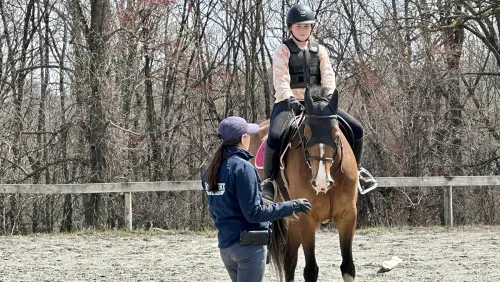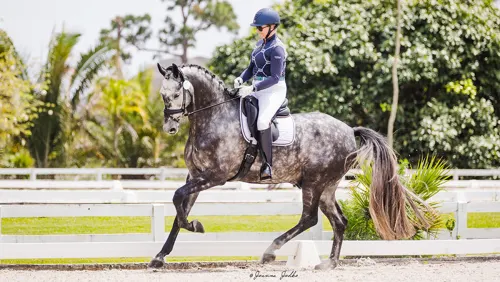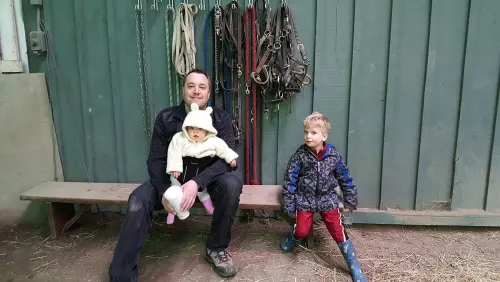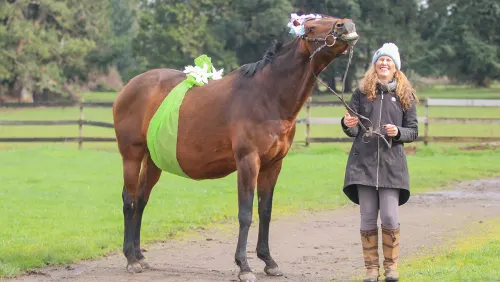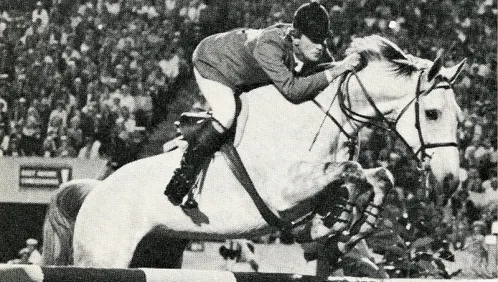There isn’t a gentle way to start this post, so I’m just starting: [In March], my horse passed away.
It was a Monday, so the barn was closed until 3 p.m. As you can imagine, I was concerned when my phone went off at 6:00 a.m., and the barn owner was calling. (For those of you who don’t have a life with horses, that’s never a good thing.) She said he had a little tummy ache, and I drove illegally fast the entire way there in my pajamas and whichever coat my fingertips reached first.
I’ll save you the traumatic details of what followed and give you the spark notes instead. All you need to know is nothing that could be done at the barn was helping, so we ran to [Cornell] Ruffian [Equine Specialists in Elmont, New York]. The last time I saw him, he was being prepped for surgery. All that followed was a lot of phone calls and trips downstairs, where we were told worse and worse news with each visit. Eventually, euthanasia was put on the table, and I made a decision without a moment’s hesitation—when euthanasia is an option, there is seldom truly an option.
We left with an empty trailer, empty blankets, an empty halter and a piece of tail taped at either end. I couldn’t breathe.
I spent the next few days in Vancouver on a trip to see my significant other for the last time, with my phone going off every minute with condolence after condolence. That trip was going to be sad anyway, and it somehow managed to be more miserable than I could have imagined. I appreciated the love people wanted to share with me immensely, and I wouldn’t have gotten through that first week without all of it, but it was a lot to take in during such a short period of time. I managed to sleep more than I knew I could that week (entire days), and eating was very difficult. Getting on a plane and going home was the impossible task, and I barely managed it.
When I got back to New York, the world I left behind still existed. Everyone still felt sorry for me; my car still smelled like iodine scrub, and my horse was still dead. To add on to all of that, I’d seen someone who I truly believed would be the only person I loved for the rest of my life for the last time, and reality was hitting me like a baseball bat to the face. My aunt tolerated my morbid jokes and sporadic crying, and my parents always answered my phone calls. My friends were supportive of me (each in their own ways), and my boss let me take off a week from work. My significant other was incredibly understanding, and for the first time in my knowing him, he let me call him to cry whenever I wanted to. Despite my mourning, though, all I wanted to do was get back on a horse.
My first day back was overwhelming, as was to be expected. My hands shook the entire drive to the barn, and I thought of a thousand different ways I could say, “Please don’t touch me,” without hurting people’s feelings. I knew I had a lot of hugs I couldn’t stand coming my way and wished everyone would kindly leave me alone. I had to give people the rundown of what happened every five minutes, and even people who didn’t come up to me were pitying me from a distance. Being the girl with the dead horse really isn’t fun.
ADVERTISEMENT
Fortunately, my first ride back was better than I could have wished. I lessoned on Tanner, who I’d leased the year prior. I made all of my distances, kept him together, and rode with confidence. It was like we’d never been apart. I finished my last course and cried like a baby, grateful that he was there for me every step of the way, as I knew he would be.
Each of my rides thereafter continued to be better and better. I cried every time I got off a horse for a week, including at a horse show my second day back in the States. Getting to the barn got easier, and my hands eventually stopped shaking, but it still felt like I was dragging myself there with cinderblocks strapped to my ankles. I weepily banked my horse’s stall and found myself uninterested in my photography, but I was never going to not get through it, because my friends and family were there to catch me every time I felt like I was falling.
When I came home, I was anxious over whether people would judge me when I started looking for horses as soon as the plane had touched the ground. I remembered grumblings going on when another girl who boarded with us seasonally had imported a new horse shortly after her young mare had foundered, and I became nervous about doing something people disapproved of. I knew, though, that if I took too much time off before looking for something new, I’d never come back strong, and I’d miss my chance at finals. The search began as quickly as I’d asked, and we were in the car looking at a prospective horse two days after I got home.
My biggest fear coming out of Ruffian was that I’d never love riding again. My second biggest fear was how long it’d take me to find something I really loved and could work with.
Here’s what you need to know about Boo before I go any further: He was perfect. I truly don’t say this because I think all horses are perfect (which they are). Boo was my heart horse. He was kind and forgiving and took every joke I threw at him. When I slam chipped a fence or yanked on his mouth by accident (don’t panic—he barely had anything in his mouth), he would canter out without a fuss, like, “OK, wow mom, you really screwed that up, but let’s just try it again,” and we did. I would run him through a fence, and we’d try again. I jumped him over a standard and knocked the entire thing over, but he let me try again. I ran him into a wall once, and he walked away from it without a complaint. Mo matter what the task, Boo was up for teaching me, no matter what it cost him.
He was the cuddliest bear in the barn, and kisses were never far from you. He was gentle with children and loved dogs. He groomed my favorite pony and loved nuzzling the top of my head. He was generally kind to the horses and people around him, and he slowly became the most social horse in the barn. His face was always hanging outside of his stall, looking for his next kiss victim. He let me take thousands of pictures of him and even let me put a hat on him. He stood for my graduation photos and tolerated a tassel flying in his face. On my best days, he stuck his nose on mine and gave me kisses, and on my worst days, he hung his head on my chest and let me breathe through whatever I was dealing with. He was my best friend and my teammate.
No one prepares you for when your horse dies, and there is no clear-cut program to making yourself feel better. I always knew death would be a part of my life with horses, but it was never supposed to happen this soon. I saw too much too soon and did more paperwork for vets and insurance companies by the end of my two months with him than most people deal with by their third horse. I had to balance crying when I couldn’t help it with being on the phone every day to answer detailed questions about his passing for half a dozen different people. My life was never supposed to go this way, and my biggest task became learning how to cope when everything felt broken, when giving up felt like a viable option.
ADVERTISEMENT
What I’ve learned from all of this was there is no correct way to come back from a traumatic loss. I also finally learned the value of being able to ask for time away from my obligations (i.e. getting a week off work or getting an extension on school assignments). I also learned that not everyone needs to know what you’re going through. (Sorry to the man I yelled at when he tried to get me to smile… but also please don’t ask me to smile for you?!)
Mourning comes in waves, and I know that two weeks out I’ve only touched the tip of the iceberg. I think I’m through the rollercoaster of sadness and anger and through wanting it to be the only thing I talk about with people. I don’t cry unexpectedly anymore, but I still cry (a lot). I think I’m starting to feel OK enough to get through the day without feeling like I’m forcing myself out of the house anymore. I think I’ve found a new horse I love, one that will make me feel proud to be her teammate, a companion.
So what have I learned? Well, I’ve learned that life is really unfair no matter how much goodness and love you try to put into the universe. I’ve learned that no matter how many times you pick your horse’s feet or how long you spend poulticing and wrapping their legs, an anatomical error cannot be beat, and death is stronger than any fly spray you own. I’ve learned to be OK with anger and cry when I need to. I’ve learned that people will feel sorry for you for a long time, but they will also feel really happy for you when you learn to rediscover the love that brought you to horses in the first place. I’ve learned that people will wrong you no matter how much you’re enduring, and sometimes your horse dying can’t change how selfish and inconsiderate people are. I’ve learned that your significant other will do things out of loneliness right when you leave that will destroy every fiber of your soul, and that it doesn’t matter that your horse died to them, because your trauma doesn’t keep other people from acting out of their own selfishness. I’ve learned that despite being disappointed in people I thought I loved, I have an incredible support system, and no matter how lonely I may feel, I will never be without love.
So when you lose your horse and you don’t know how to cope, start with breathing in, and then take it one day at a time. I’ve learned to choose kindness and to apologize when I slip up and act out of anger. I’ve learned to do things in my own time. I’ve learned the true value of getting back on the horse. I’ve learned to keep my favorite book, “To Kill A Mockingbird,” in my bag at all times, because there isn’t a frown that Scout Finch can’t lighten into a chuckle. I’ve learned that Sufjan Stevens only works for me when I’m at my worst, and I couldn’t be more grateful. I’ve learned to write and write a lot.
You will falter and fall down a dozen times for every step you take forward, but the weight of mourning will only crush you enough to keep you in bed with the lights turned off for a while. It won’t kill you, and things do start to go your way eventually.
Shelby Phillips is a recent graduate of New York University Tisch School of the Arts, where she majored in drama with a minor in child and adolescent mental health studies. She spent her summers riding while on vacation with her family and started riding more seriously when she went to college. During her time at NYU, she was a member of the equestrian team and later a co-captain her senior year. She is currently a writer and photographer for Sidelines Magazine, a sales associate at Manhattan Saddlery, a part-time groom and a photographer for her own business, Shelby Phillips Photography. Horses and theater are her true loves, and she hopes to continue splitting her time between Manhattan and Long Island, so that she can do both.










